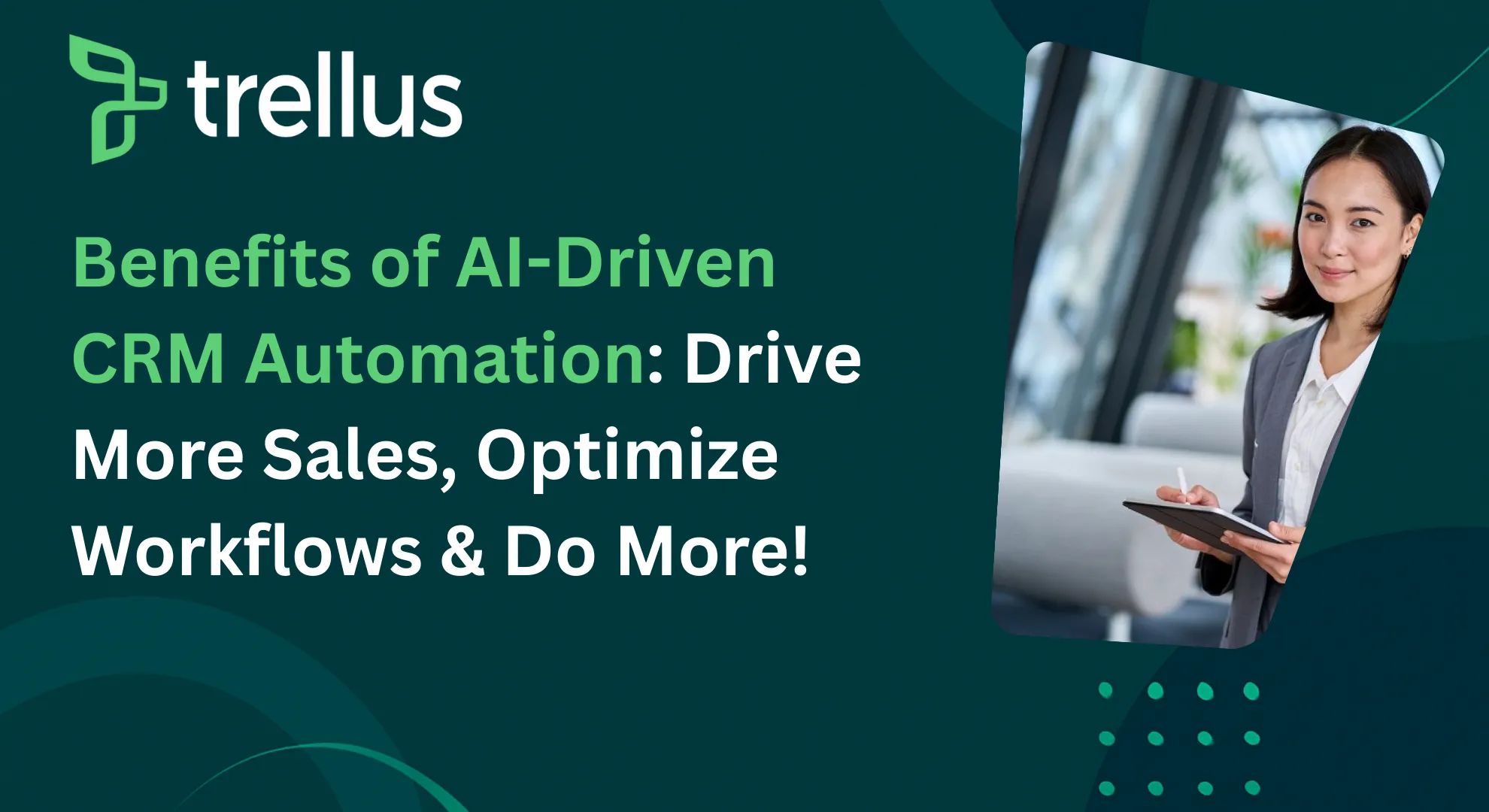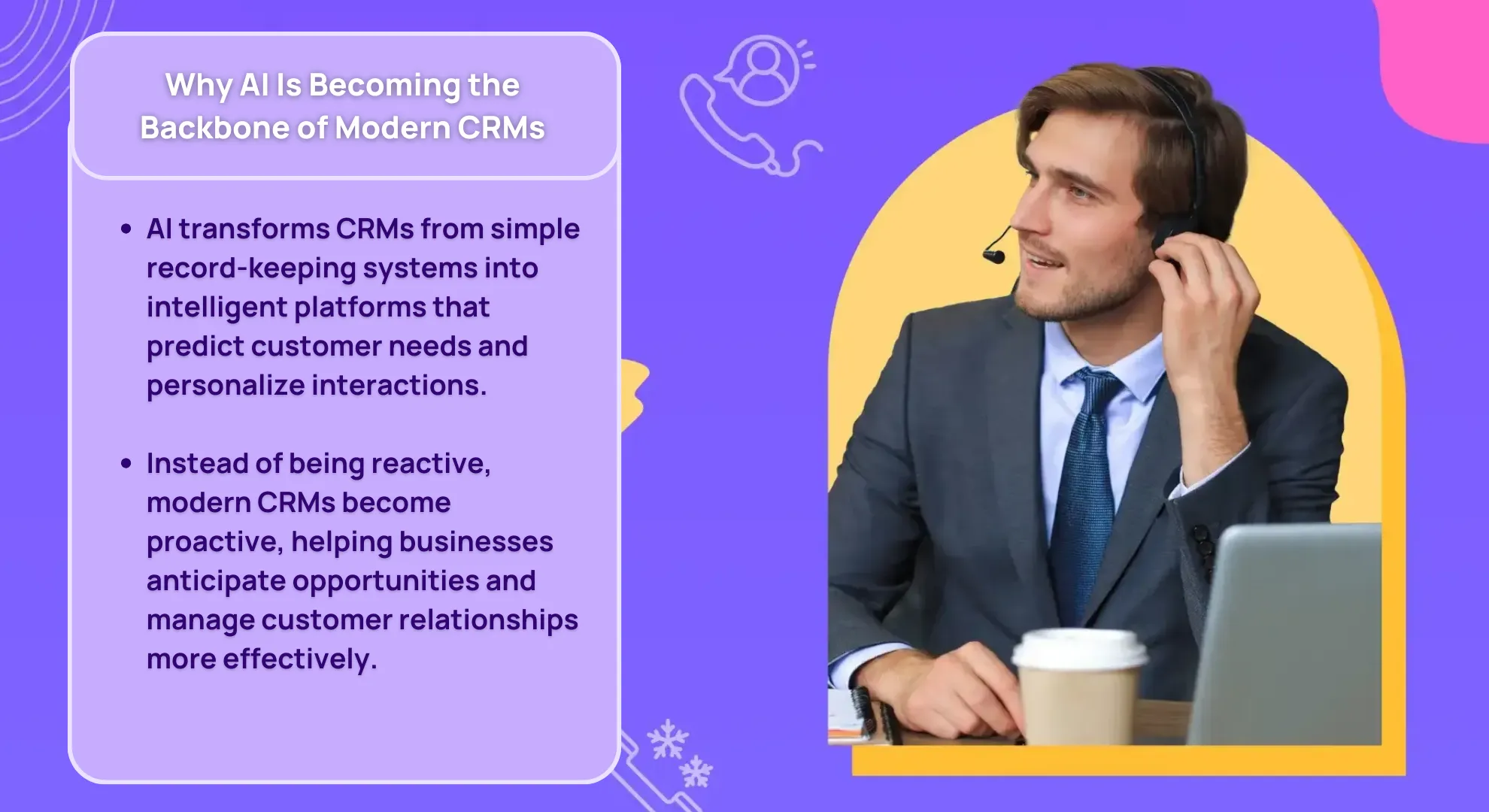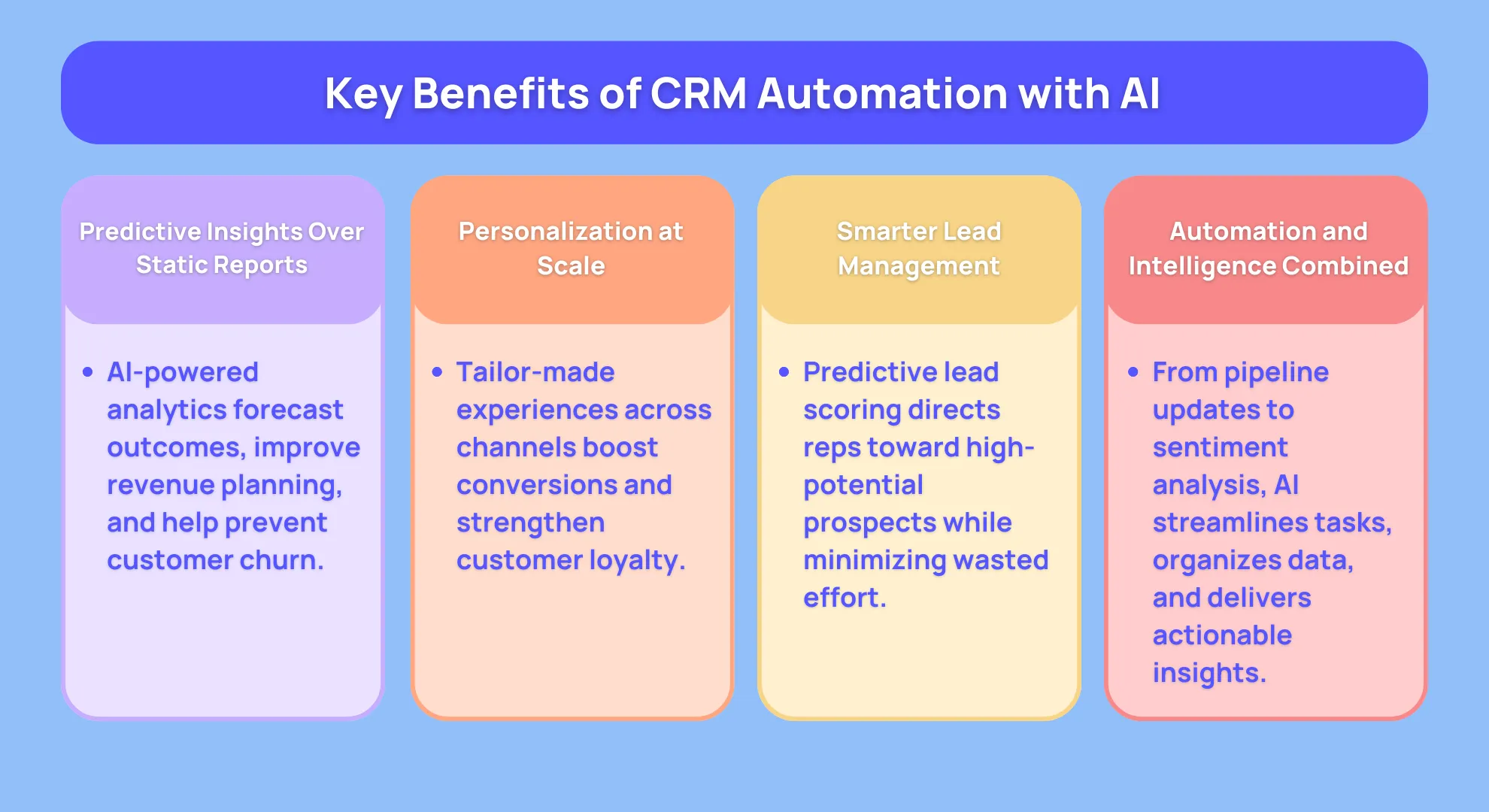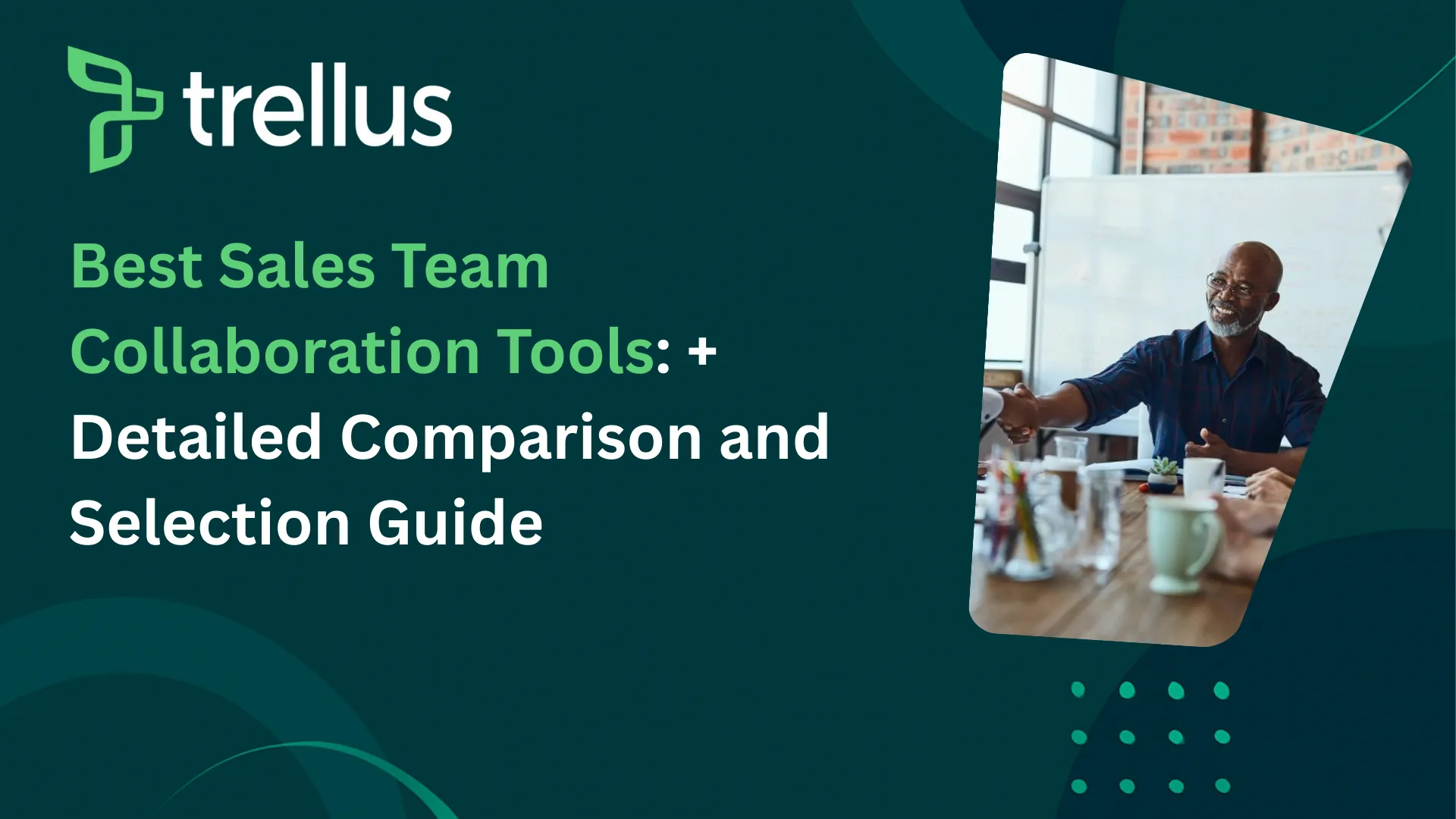
Our Top Picks


The way businesses interact with customers is changing faster than ever.
People expect personalized service, quick answers, and a smooth experience across every touchpoint. Traditional CRM systems have done a decent job of helping businesses manage relationships, but they weren’t built for the speed and complexity of today’s world.
That’s where crm automation with ai is rewriting the rules these days. And it will continue to do better results in the near future.
Instead of CRMs just being databases that store information, AI transforms them into intelligent engines that not only keep track of customer details but also make sense of them, predict outcomes, and even automate tasks that used to eat up hours of work.
For sales teams, especially the ones involved in outbound sales relying on cold calls, or SDRs/ BDRs, this means more time selling and less time buried in admin tasks. For customers, it means a more personalized and proactive experience that makes them feel valued.
The modern sales team that leans on intelligent CRM software is in a far better position to deliver what today’s buyers want — and stay one step ahead of competitors.
Why AI Is Becoming the Backbone of Modern CRMs

CRM systems were originally designed to keep track of customer interactions, store contact information, and give teams a shared place to manage deals.
Useful?
Definitely. But in a world where customers interact across email, social media, live chat, and in-person events, the old model quickly falls short.
AI brings a layer of intelligence that makes these systems more than record-keeping tools.
With features like AI-driven customer segmentation, predictive lead scoring, and real-time CRM analytics, businesses can understand not just what their customers did in the past, but also what they’re likely to want next.
The result?
The modern-day version of CRMs stops being reactive and becomes more proactive.
Instead of reacting to customer complaints or missed opportunities, businesses can anticipate them, personalize interactions at scale, and manage customer lifecycles in a far more efficient way.
Personalized Customer Journeys Through A.I.
One of the most powerful things AI does in CRM is enable personalization.
Customers don’t just want generic offers anymore. They expect businesses to remember their preferences, understand their needs, and treat them like individuals, not ticket numbers.
With personalized communication at scale, AI can sift through massive datasets to identify patterns in customer behavior. It can recognize buying habits, preferences, or even signals of dissatisfaction. From there, it tailors experiences to each individual.
- Product Recommendations: An online fashion retailer using the best crm software with ai marketing automation USA can suggest clothing items based on browsing history and seasonal preferences.
- Email Campaigns: Instead of blasting out the same email to thousands of people, sales teams can send messages fine-tuned to where a customer is in the customer lifecycle automation process.
- Next-Step Suggestions: A software provider can use smart CRM workflows to recommend onboarding resources when a new customer first signs up.
Personalization doesn’t just improve sales conversion rates — it creates lasting loyalty because customers feel understood.
Predictive Analytics: Seeing What’s Coming Next
Sales teams have always relied on forecasting, but AI makes it far more accurate. With real-time CRM analytics and predictive modeling, businesses can anticipate customer behavior, churn risks, and buying intent long before the customer takes action.
This type of predictive lead scoring helps teams prioritize their time. Instead of chasing every lead equally, they know which prospects are most likely to close and can allocate resources accordingly.
For example, a B2B SaaS company might notice that leads who download a particular whitepaper and attend a demo have a 70% chance of converting within two weeks. AI picks up on this pattern and alerts sales reps to jump on those leads quickly.
This isn’t guesswork. It’s data-driven selling that turns CRMs into predictive engines, giving teams the confidence to act at the right time.
Enhanced Data Management: Turning Chaos Into Clarity
One of the biggest challenges for any sales or marketing team is the sheer volume of data coming from different channels. On that note, we’ve got emails, website visits, social media engagement, phone calls, and customer support tickets.
A traditional CRM might store all this, but it rarely gives a clear, actionable view.
AI thrives on big data. With intelligent CRM software, it can not only organize structured and unstructured data but also interpret it in ways humans can’t at scale. Using natural language processing and machine learning, AI tools identify trends, spot anomalies, and summarize insights for decision-makers.
This means sales managers aren’t wasting hours crunching spreadsheets or pulling reports. Instead, they get real-time CRM analytics dashboards that surface exactly what matters, which campaigns are working, which leads are hot, and which accounts are at risk.
24/7 Customer Support & Outbound Cold Calls with AI-Powered Tools

Customers today don’t stick to “business hours.” They expect answers whenever they need them, whether it’s midnight on a Saturday or first thing Monday morning. With AI-powered customer engagement tools like chatbots and virtual assistants, businesses can meet those expectations without burning out their teams.
An e-commerce store, for example, can set up a chatbot that instantly answers common questions about shipping times, return policies, and product availability. This is marketing automation with CRM in action — saving human agents for more complex issues while ensuring customers never feel ignored.
What makes modern AI chatbots different from the old, clunky ones is their ability to learn. Over time, they get better at understanding intent, picking up nuances, and delivering responses that feel human, not robotic.
Proactive Service Management: Solving Problems Before They Happen
AI doesn’t just wait for customers to raise their hand with a complaint. With customer lifecycle automation, it can detect signals that something might be going wrong and intervene before the customer even realizes it.
For instance, a SaaS provider might notice through AI analytics that a customer has stopped logging in as frequently or hasn’t used key features of the platform.
That’s a red flag for potential churn. Instead of waiting until the customer cancels, the CRM can trigger a proactive message — maybe offering a tutorial, inviting them to a training webinar, or giving them a discount on an upgrade.
This kind of AI-powered customer engagement turns reactive support into proactive relationship-building. Customers feel looked after, and businesses reduce churn.
Smarter Issue Resolution with AI Recommendations
Even when issues do arise, AI can speed up resolution dramatically. Instead of customer service reps spending time digging through old tickets or asking colleagues for advice, smart CRM workflows can surface suggested answers instantly.
Imagine a customer contacts support about a billing error.
The AI system compares the case against hundreds of similar past tickets, finds the resolution that worked best, and recommends it to the agent in real time. The customer gets a quick fix, and the rep looks like a hero.
For high-volume sales teams, these AI-driven automations help to reach out to more customers, resolve any issues that leads may have during the conversion process, and vice versa. So, you can see that artificial intelligence in CRMs, or as an independent digital solution, not only works for CSRs but also for BDRs and SDRs.
Real-Time Sentiment Analysis: Listening Between the Lines
Every business collects feedback, but it often takes weeks or months to process.
By that point, the insights are outdated. AI flips this by running real-time CRM analytics that track customer sentiment as it happens.
This isn’t just about reading survey responses. AI tools can scan social media comments, support transcripts, and online reviews to detect tone and emotion. If negative sentiment spikes around a product launch, the system alerts managers immediately so they can investigate.
For retail brands, this can mean catching a product defect before it spirals. For the hospitality industry, or a similar services oriented platform, it might mean turning around a poor guest experience before it shows up in public reviews.
Either way, in all cases, sentiment analysis gives businesses a real-time pulse on customer happiness.
Generative AI and the New Customer Experience
The arrival of generative AI is pushing CRM even further. Instead of just analyzing data, generative AI technology can easily create a bunch of things, or automate stuff so that the repetition factor is completely eliminated.
Customers will only embrace AI-driven personalization if they trust the companies behind it. That’s why customer trust is the new currency. Transparency about how data is used, strong ethical guidelines, and human oversight are all essential.
Forward-thinking CEOs are already framing AI-powered customer engagement as not just a tech investment, but a trust investment.
But the important thing, aside from the “let’s embrace technology for the sake of it” factor, is doing it right.
We previously highlighted this issue in one of our posts about generative artificial intelligence and its effects on improving SDR sales/ workflow. The main issue with any new or existing technology is the implementation process.
We’ve got tons of tools available right now. AI is either a core part of those programs or is a standalone solution.
But many businesses don’t know which programs to go for, how their integrations work, and how to implement the entire thing in the first place. We’re talking about technical implementation in terms of installation, porting over your existing work, transitioning to new workflows of the said program, and training the team.
That’s all too important, and more of a white elephant in the room that people don’t highlight that much.
Key Benefits of CRM Automation with AI

To summarize the practical value of crm automation with ai, here are some of the core benefits businesses are already seeing — expanded with real-world relevance:
Traditional reporting tells you what happened.
AI reporting tells you what’s likely to happen next. With predictive models, businesses can plan better campaigns, forecast revenue more accurately, and prevent customer churn before it’s too late.
- More and Better Personalization Options/ Experiences
With personalized communication at scale, every interaction feels tailor-made.
From website content to targeted ads, customers see messages that resonate with their unique situation — leading to higher conversion rates and stronger loyalty.
- Better Lead Scoring
AI-driven predictive lead scoring takes the guesswork out of sales.
Reps know which leads to focus on, which to nurture slowly, and which to drop — ensuring no energy is wasted on low-probability opportunities.
- Advanced Automation
With automated sales pipeline management, repetitive tasks disappear.
Things like updating deal stages, sending follow-up reminders, or assigning leads to the right rep happen seamlessly in the background.
- Sentiment Analysis and Social Listening
AI doesn’t just track numbers; it understands emotions. If someone were to monitor unstructured data across reviews and social platforms, companies can quickly pivot when customer sentiment changes.
- Smarter Data Handling
Instead of drowning in information, businesses using intelligent CRM software get clarity. AI organizes unstructured data, applies context, and delivers insights that humans can act on immediately.
The Future of AI-Driven CRM
The future of CRM isn’t about adding more features; it’s about making the customer experience smarter, faster, and more personal.
We’ll see AI-driven customer segmentation become more granular, marketing automation with CRM becoming more seamless across channels, and real-time CRM analytics becoming the standard for decision-making.
For sales teams, the shift is already clear. Those who adopt the best crm with ai sales automation are closing more deals, wasting less time, and delivering experiences that customers rave about. Those who don’t risk being left behind.
The path forward is simple: embrace AI, but do it thoughtfully. Keep customers’ trust front and center, build systems that empower employees rather than replace them, and aim high with what your CRM can achieve.







